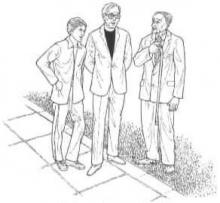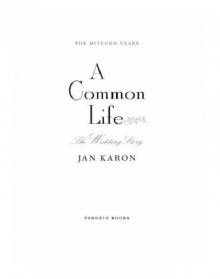Somewhere Safe With Somebody Good Read online
Page 8
‘What did you just write?’ Lois craned her neck to see for herself.
‘A Helpful Household Hint,’ said Hessie, slamming the notebook shut.
‘I didn’t know you wrote th’ Household Hints, I love th’ Household Hints. I used a banana peel on my pumps just yesterday. It was a mess to get off, but it worked.’
She had no intention of saying that Vanita Bentley, whose official job was Classifieds, was now writing fifty percent of the Hints, including that ridiculous banana peel business. This was a job Miss Heloise Bentley had taken on without asking a by-your-leave of yours truly, who had done all the important writing at the Muse for twelve long years, including the Lady Spring pieces which everybody was crazy about, and Mayhew’s Mitford which had made her famous in two counties, if not three.
Out of the blue, Vanita had scribbled a snowstorm of Hints, and, unable to fit another scrap onto the hog pen J. C. Hogan called a desk, piled a shovelful in his swivel chair.
So did Mr. High and Mighty say, I’m sorry, but Hints is Hessie’s job? No way. Traitor to the end, he grinned over that jumble like every jot was a Shakespearean sonnet. You’d think he’d won the lottery when he came to “Restoring Color to Your Carpet,” a Hint he said his wife, Adele, would put to immediate use in their den.
Don’t think that little episode didn’t bring forth the bitter memory of Mitford’s first celebrity wedding, when, following graduation from Appalachian State, the daughter of a former governor’s ex-girlfriend’s first husband’s niece who’d had a bit part in As the World Turns got married at the Methodist chapel.
Had Vanita ever written anything but Sofa-for-sale and Used-baby-carriage-dirt-cheap? Could she write, punctuate, or even spell? Nada. Yet she took it in her head to cover the wedding in case it had somebody famous in it. Quick as a fox, Vanita Schmita slapped a story on J.C.’s desk before the bride could stuff herself into a going-away pantsuit that was the wrong shade of green for sallow coloring.
She, Hessie, had slapped a few impromptu stories on the so-called editorial desk herself, and many had never been seen again. But let Vanita toss her scribbles in that Dumpster with drawers, and he would sniff them out like a hound. In a heartbeat, there was the wedding story splattered over the front page, and a color photo mostly showing the backs of people’s heads.
She would long remember the intense rush of pleasure it gave her to read:
Spring Brake Leads to Fall Wedding
No indeed, she would not be writing the tacky Hints so dear to the hearts of Vanita Bentley and J. C. Hogan, like how to shave fuzz off a sweater or make your own underarm deodorant. She would stick with such time-honored Hints as how to remove red wine stains from white napery, or how to make old knives as sharp as new. She would never stoop to serve the lowest common denominator—those who didn’t wish to remove stains or sharpen their knives. This week, her Hint was “How to Clean Leather Book Bindings,” though hardly anyone cared about books anymore, much less leather-bound.
The only person she knew who owned such treasures was Father Tim—he had a bookcase full. Years ago, when she was still in floral arrangements, she went to the rectory to meet with him and Cynthia about their wedding flowers. She recalled that Cynthia wanted roses and lilacs and had to be told very firmly that there was no such thing as roses and lilacs in September, Mitford weddings were done with what people had in their yards. And hadn’t everybody raved over what Hessie Mayhew had fashioned out of twigs, berries, and pods with a few hydrangeas thrown in?
The point was, if the Hint for this week appealed to just one person, that was enough. Such disagreeable crumbs as “The Homemade Smell Remover” were not her bailiwick, though it was certainly one way to attract the huddled masses—didn’t they have dogs and cats and even pet pigs that slept anywhere they liked, on furniture of mixed description and in people’s beds?
‘I wonder if he saw any fairies,’ said Lois.
There was no way to miss the sandwich board at the foot of the steps leading to A Cut Above:
Welcome to Mitford
Shirlene Hatfield!!!
All hair services
The famous Spraytan
Acrylic Nails
Wi-fi
Free Wine and cheese this week only
Trims $10 this week only, MEN ONLY
Special on color through Sept. only
The Collar Button man, whose name, for some inexplicable reason, he could never retain—Eddie? Freddie?—emerged from the men’s shop next door and lit his meerschaum pipe.
‘Glad to see you, Father. Going up for a haircut?’
‘Not if I can help it. Going up yourself?’ The subtle force of pipe smoke on the morning air . . . The Collar Button Man raised an eyebrow. ‘Wi-Fi? Barry White? Cheap wine? Not I.’
‘I’ve seen a black limo cruise through a couple of times,’ he said, ‘but didn’t see where it’s from.’
‘North Carolina. I’ve also heard California. Definitely a car service plate.’
‘Any idea what it’s all about?’
‘Winnie Kendall has had two sightings and is hoping for Elvis. Fancy Skinner has had one sighting and is rooting for George Clooney on a search for mountain real estate.’
The Collar Button man released a veritable plume of smoke.
He sprinted by the shoe store, formerly the Main Street Grill, where for four decades Percy Mosely had curmudgeoned his customers, local and otherwise; and where, for all Percy’s love of menu experiment, the Livers and Gizzards Special had been the great hosannah, the magnum opus of the Grill’s long history.
Before he retired from Lord’s Chapel, the rear booth had been generally known as ‘the Father’s pew.’ He always sat with his back to the front door, symbolic, perhaps, of shutting out the maelstrom for an hour.
He’d been fond of those days.
• • •
SITTING ON A BENCH beneath the awning of Happy Endings Bookstore, Coot Hendrick looked up to see Preacher Kavanagh balling the jack up Main Street. Out of respect, he stood and held out his hand, which the preacher stopped and shook.
‘Coot, how are you?’
‘I never growed up with people runnin’,’ said Coot. ‘Some of ’em, they run right out in traffic.’
‘How’s your mother?’
‘Mean as a rattlesnake.’ Coot grinned, baring a set of gums appointed with stubs for teeth. ‘I heered you fainted like a woman when th’ cops come on y’.’
‘Good to see you,’ the preacher said, and there he went like a shot, didn’t think that was funny a’tall.
• • •
THEY WOULD BE SLEEPING AGAIN tonight on the sofa—there was an odd comfort in seeing the blankets folded at one end, the pillows stacked at the other. She was squeezed in between the bedding gear, reading; he had commandeered the wing chair with Violet on his lap.
He looked at his wife over Thomas Traherne’s Poems of Felicity—her glasses had skied to the end of her nose. As always when reading, she had left these parts for an obscure outer planet.
He had a go at his own book, but his mind dipped and reeled like a swallow in summer air. He had no idea what he had just read, possibly because he had occupied himself with scratching a rash on his neck which appeared today for no good reason. Just there, under his left jaw, suddenly populating the privacy of his flesh.
‘A rash,’ he told his wife, jabbing a forefinger in its general direction.
She looked up, unmoved.
‘Can you see it?’
‘I can,’ she said. ‘These things happen.’
She was so cool, so distant from suffering, always a better man than himself. Why should he be pitiable and complaining, and she ever stalwart? He was the priest, she the mere deacon, appointed by himself without official credentials of any kind, yet ready, of course, in all situations to stand for what was right and good.
Even with the ankle business throughout their Ireland trip, she was undaunted save for a single weeping spell which helped alleviate the tribulation of sitting for days with her foot elevated.
He hated this about himself, his whimpering. Churchill’s mandate to never explain and never complain was baloney. He had read the man’s letters to Clementine and was hardly surprised to learn that the old so-and-so had grumbled as bitterly as the rest of the common horde.
Here he was, seventysomething, and still whining, though God had woven like a gold thread through every chapter of every book of Holy Writ: Rejoice! Know that I am with you and for you and will never leave you; take courage that I will fight for you and be your shield and buckler and provide for you when you are old; I will supply your every need, I will give you victory over death, I have prepared a place for you in heaven . . .
Every imaginable love and consolation had been and was currently being delivered to him, and yet he had no wit or gumption to receive it. Abject, a worm, he lifted a silent petition for grace.
She turned a page.
‘Besides the rash . . .’ he said, eager to divulge the entire calamity, ‘my right eyeball is scratchy.’
The blank look.
‘Like sandpaper.’
‘What’s really the matter?’
‘What do you mean?’
‘It isn’t the rash or the sandpaper. What’s really wrong?’
He opened his mouth to protest, but knew he couldn’t cover himself. What was really wrong was . . . He felt tears in there somewhere. ‘I’ve lost something,’ he said, swallowing down the knot.
‘Like?’
‘Like . . . passion.’ It was hard to use that word, which was so often overused, but there it was. ‘Like . . .’ He closed his eyes. ‘I feel useless,’ he said, humiliated to confess this, even to her.
‘Feeling useless is a good thing.’
He had no comment on such ridiculous thinking.
‘There have to be rest stops in music. There must be winter for the roots of a plant to dig down and grow strong for spring. There—’
‘Please,’ he said.
‘You do this at least once a year, ever since you retired. In fact, you just did it in Ireland! And I drag out all my homilies and metaphors and somehow we manage to push on.
‘Listen to me, sweetheart. What happened in Sligo? The woes of an entire household fell on you; souls were spared because of a meddling priest. You had just come from saving the life of a total stranger who happily turned out to be your brother. Before that, there was our year at Holy Trinity, where you restored a parish gone to ruin for forty years.’
‘You always say these things.’
‘Somebody has to say these things. You have an insatiable craving to always do more, nothing is ever enough. You want God’s job.’
‘Cynthia.’
‘It’s true. It was this very refusal to slow down and be useless once in a while that forced you to retire. You were killing yourself.’
He had no words; words were impotent, tiresome.
‘Remember the cave and how you’d been plagued with always wanting to get it right, whatever that means? Remember realizing that God and God alone is the only one who always gets it right?’
‘I know this,’ he said, angry. ‘I’m not a child.’
‘Think how you rounded up a scattered family, lost from each other for years—all Dooley’s siblings together now, and Dooley—you took a thrown-away boy into your heart and helped him become a young man of character—look at him and what he’s making of himself. Look carefully at him when you’re feeling useless, and remember Morris Love while you’re at it, and Buck Leeper and Dooley’s mother and legions of others too numerous to mention.’
It was that numbskull write-up in the Mitford Muse, it was Hoppy Harper going out there to make a difference, it was time racing by, it was his complaining in the face of God’s benevolence, it was his dog growing old, it was—it was jet lag, he didn’t care what anybody said.
He put his head in his hand. And as yet my love is weak, he prayed as did Thomas à Kempis, and my virtue imperfect and I have great need of your strength and comfort . . .
She stood and came to him and sat on the arm of the chair. ‘Honey . . .’ she said.
He liked it when she called him honey, which she almost never did. Yankees were accustomed to using the word exclusively for the produce of bees.
‘I could get started on your new studio,’ he said. He had promised it to her when they were in Sligo; he saw the light-filled space as clearly as if it were real. ‘I could call Buck and we could get estimates.’
‘No,’ she said. ‘Thank you, darling. It’s too much right now. Sawing, drilling, hammering, people in the house. I like my little room, it’s been good to me. Maybe one day. I was thinking you might raise some money for the Children’s Hospital. That always puts you in a bright mood.’
‘No, no, raising money puts me in a dark mood.’
‘Yes, but once it’s raised, you’re in a bright mood. The capital campaign will be announced soon. As the auction chair, I’ll know more next month. We’re desperate for beds, Timothy, they’re starting to turn children away. I think we’ll be going for five million.’
Five million! He was literally stunned.
She got up and went along the hall. Talk about sweeping from a room.
Violet jumped from his lap and followed. He got up and did the same as Cynthia vanished into the guest bath and closed the door.
In his years as a donor, they had never gone out for such a sum. Historically, it had been a roof repair here, a few new beds there, a van, a ‘gently used’ ambulance, a geothermal system. But five million? Where on earth would they find it in these mountains? Maybe a half million if they burned up the road, knocked on every door, and with begging cup in hand cornered the stray tourist. He felt he’d done all he could in recent years, having worked each potential donor he knew, save, of course, the fabled North Star of Donorship which was Edith Mallory. Others had tried Edith and failed, and since the fire, hardly anyone tried anymore.
There went the flush; out she came. He tagged along to her studio and sat on the minuscule love seat.
‘What?’ she said, giving him the eye.
‘You’re right. I just did this in Ireland, the whining. I had forgotten that. I’m sorry.’
‘Just because we’ve been away for three weeks doesn’t mean ’t was a grand holiday we were havin’.’
‘No picnic, I grant you.’
‘I love everything that happened in Sligo, even the ankle business for what it gave me in return—but it was exhausting.’
She came and squeezed in next to him. ‘Do us both a favor and give yourself a break. Let’s have a rest stop before the next fanfare.’
Maybe he’d thought there wouldn’t be a next fanfare, that the fanfares were over. He took her hand in his. What he’d ever done to deserve her was a complete mystery.
She rested her head on his shoulder, sighed.
‘You’re so southern,’ he said.
Chapter Five
He read the Hint, and realized it made no impression whatever on his psyche.
Why prolong the agony? He turned to the Muse’s midsection.
As was his wont on the occasional Thursday, he read aloud to his wife, who was filing her nails at the other end of the sofa:
Does Mitford Still Take Care of Its Own?
by VANITA BENTLEY, Special Correspondent to The Muse
Mitford police recently surprised a local couple in the front hall of the McGraw Residence on Bishops Lane.
‘Wait a minute,’ he said. ‘What does this have to do with Mitford taking care of its own?’
‘Read on,’ she said, ‘I’m sure there’s a connection in there somewhere.’
“At seven forty-five in the even
ing,” said Mitford police Captain Joe Joe Guthrie “we got a call from a neighbor on Bishops Lane who said a strange car had been parked at the McGraw residence twice that day. I made the decision to go up with Officer Lonnie Greene.
“We approached the darkened house on foot as we did not want to go rolling in there without knowing more of the situation. The moon was about full which can be very useful in Police work. We could see two people moving around in the front hall. Office Greene and I took up a position on either side of the front door.”
“Intruders usually come out the door they go in,” said Officer Greene “and we figured this was the door they went in.”
Well guess what people it was not intruders, it was . . .
‘Get this,’ he said.
. . . it was Father Time Kavanaugh and his wife Cynthia . . .
‘Father Time,’ she said. ‘I love typos.’
‘And Kavanagh with a u.’ He looked at her, disbelieving. How many years did a person have to live in a town for the local paper to get their name right?
. . . who were checking on Ms McGraw to see if she was OK!!
The Kavanaughs said they had called the McGraw Residence twice that day and gone by earlier to check on Ms McGraw when she didn’t answer her phone. They found the front door open and decided to go in and look around to see if maybe Ms McGraw had fallen down the stairs but she was not there. They left the door open, but&^ returned at sundown with the intention of closing the door if it was still open.
Unfortunately Father Time fainted when he saw Captain Guthrie’s Glock 45, but he did not hurt himself in any way thank the Lord.
He dropped the paper in his lap.
‘A miserable affair, this newspaper. A disgrace. Besides, I didn’t actually faint.’
‘Don’t stop now,’ she said. ‘This is our fifteen minutes of fame.’
He poked the miserable affair with his forefinger. ‘Right here is the trouble with living in a small town. I don’t like everybody knowing our business.’
‘But we’ve known their business for years.’

 A Light in the Window
A Light in the Window Somewhere Safe With Somebody Good
Somewhere Safe With Somebody Good In This Mountain
In This Mountain In the Company of Others
In the Company of Others Come Rain or Come Shine
Come Rain or Come Shine To Be Where You Are
To Be Where You Are These High, Green Hills
These High, Green Hills Light From Heaven
Light From Heaven A New Song
A New Song Home to Holly Springs
Home to Holly Springs The Mitford Bedside Companion
The Mitford Bedside Companion At Home in Mitford
At Home in Mitford Shepherds Abiding
Shepherds Abiding Out to Canaan
Out to Canaan A Common Life: The Wedding Story
A Common Life: The Wedding Story Jan Karon's Mitford Years
Jan Karon's Mitford Years